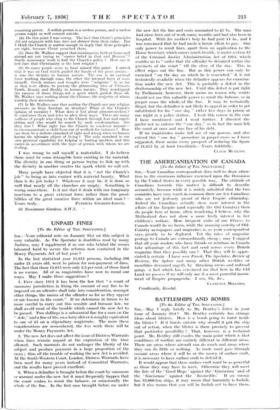UNPAID FINES
[To the Editor of THE SPECTATOR.] SIR.—Your editorial note on January 81st on this subject is very valuable. As The Spectator is doubtless read by many Justices, may I supplement it as one who behind the' scenes laboured hard to secure the reforms now contained in the Money Payments Act of last year ?
In the last statistical year 11,615 persons, including 596 under 21 years old, went to prison for non-payment of fines. The fact that these 11,615 were only 2.5 per cent. of those fined is no excuse. All of us magistrates have now to mend our ways. May I make three suggestions ?
1. Ever since 1914 it has been the law that " a court. of summary jurisdiction in fixing the amount of any fine to be imposed on an offender shall take into consideration, amongst other things, the means of the offender so far as they appear or are known to the court." If we determine in future to be more careful to, carry out this sensible and humane law, we shall avoid most of the trouble. which caused. the new Act to be passed. Two shillings is a substantial fine for a man on the " and a fine of 10s. on a.lorry-driver is roughly equivalent to one of £5 on a stipendiary magistrate. The more these considerations are remembered, the less work there will be under the Money Payments Act.
2. The new Act does not affect the issue of Distress Warrants when,. fines remain unpaid at the expiration of the time allowed. Such warrants do not endanger the liberty of the subject and produce payment in a large proportion of the crises ; thus all the trouble of working the new Act is avoided. At the South-Western Court, London, Distress Warrants have been used for many years instead of Committal Warrants, and the results have proved excellent.
3. When a defaulter is brought before the court by summons or warrant under the new Act it must frequently happen that the court .wishes to remit the balance, or occasionally the whole of the fine. In the first case brought before me under the new Act the fine and costs amounted to £5 7s. The man had since been out of work many months and had also been in hospital. With his mother's help he had paid £4 3s., and I was convinced that he had made a heroic effort to pay. Our only power to remit fines, apart from an application to the Home Secretary which causes much trouble, is under section 12 of the Criminal Justice Administration Act of 1914, which enables'us to " order that the offender be detained within the precincts of the court " till the close of the day. This in effect wipes out the fine. But as this power can only be exercised " on the day on which he is convicted," it is not technically available when the defaulter appears for examina- tion under the new Act. This is probably a defect in the draftsmanship of the new Act. Until this defect is put right by Parliament, however, there seems no reason why courts should not use this valuable power to remit the balance, or in
proper cases the whole;of the fine. It may be technically illegal, but the defaulter is not likely to appeal in order to get substituted for his " one day " either five days in prison or one night in a police station. I took this course in the ease I have mentioned—and I went further. I directed the gaoler not to enforce the " one day." so in fact the man left the court at once and was free of his debt.
If we magistrates make full use of our powers, and also extend this " one day " procedure in proper cases as I have suggested, there seems every prospect of reducing the figure of 11,615 by at least two-thirds.--Yours faithfully.
CLAUD MULLINS.














































 Previous page
Previous page